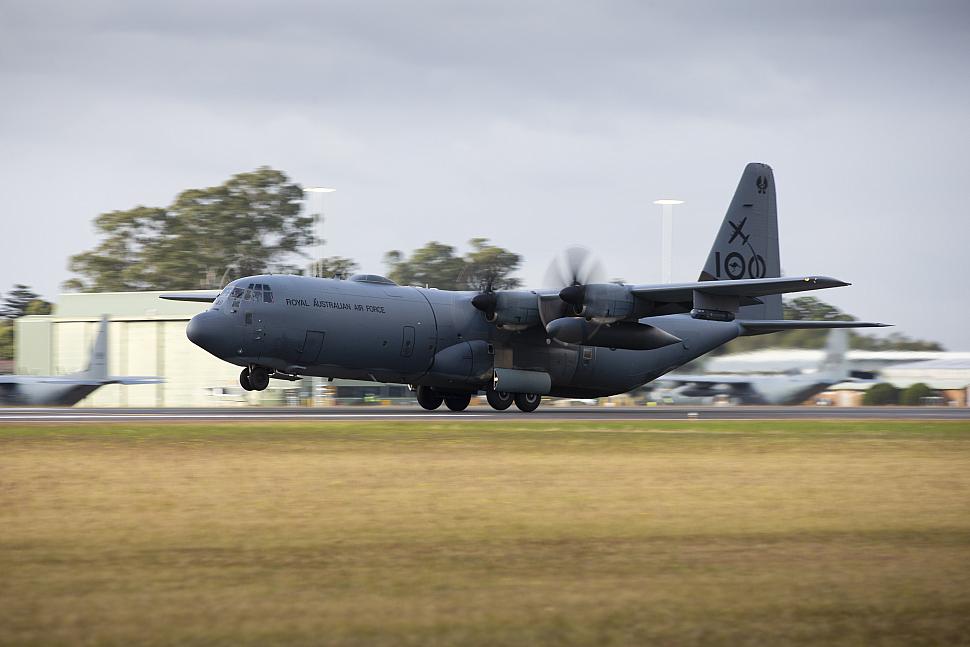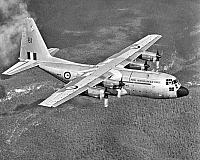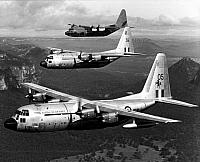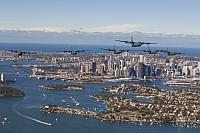C-130 News
C-130 Hercules News
RAAF C-130 Hercules reaches 850,000 flying hours
February 2, 2022 (by
Eamon Hamilton) -
The Royal Australian Air Force (RAAF) has surpassed 850,000 flying hours with the C-130 Hercules transport aircraft.

The milestone was achieved on January 21 by a No. 37 Squadron crew flying a C-130J Hercules from RAAF Base Richmond to Amberley.
Since 1958, generations of RAAF aviators flying four different variants of the Hercules have provided airlift support to Defence.
Commanding Officer No. 37 Squadron Wing Commander Anthony Kay said the 850,000-hour milestone was passed during a mission for Operation Tonga Assist 22.
"It comes as no surprise that this milestone should occur during a mission to provide important assistance to our Pacific family," Wing Commander Kay said.
"Generations of our Hercules workforce have carried urgent relief supplies over long distances to remote airfields, often at short notice, and for long periods away from their family.
"The impressive scope of what we've achieved within those 850,000 hours is a testament to the service of thousands of people who have crewed RAAF Hercules, and kept them flying."
The aircraft that flew the 850,000th hour – serial #A97-467 – is one of 12 C-130J Hercules operated from RAAF Base Richmond since 1999.
The current fleet was preceded by 12 C-130As from 1958 to 1978; 12 C-130Es from 1966 to 2000; and 12 C-130Hs from 1978 to 2012.
Throughout those 850,000 hours – the equivalent of more than 97 years airborne – RAAF aviators have flown Hercules missions to every continent, including Antarctica.
"It's probably not really possible to properly determine the distance our crews have travelled since 1958, or the amount of cargo they have carried in that time," Wing Commander Kay said.
"The number of passengers carried runs into the millions and includes Defence personnel on operations, civilian communities, heads of government, celebrities, and even animals requiring urgent air transport.
"A considerable number of Australians, whether they are Defence or civilian, have either flown on a RAAF Hercules or been the recipient of aid delivered by one of our aircraft."
The passenger experience of flying inside a Hercules has remained largely consistent since 1958, but in recent years the fleet has been upgraded to deliver greater connectivity.
This improves the airlift support available to Defence and has modernised opportunities for those on board.
"Crew and passengers flying on future Hercules missions can conduct mission planning and remain globally connected throughout their flight, wherever they may be deployed," Wing Commander Kay said.
"These upgrades will inform not only how we operate the Hercules, but how we may also upgrade and develop other air mobility platforms into the future."
Flying hours
*As of 21 January 2022

RAAF C-130J #A97-448 from 37 Sqn lifts off from the RAAF Base Richmond runway during Excercise Teak Action 21. [Photo by CPL David Said]
Since 1958, generations of RAAF aviators flying four different variants of the Hercules have provided airlift support to Defence.
Commanding Officer No. 37 Squadron Wing Commander Anthony Kay said the 850,000-hour milestone was passed during a mission for Operation Tonga Assist 22.
"It comes as no surprise that this milestone should occur during a mission to provide important assistance to our Pacific family," Wing Commander Kay said.
"Generations of our Hercules workforce have carried urgent relief supplies over long distances to remote airfields, often at short notice, and for long periods away from their family.
"The impressive scope of what we've achieved within those 850,000 hours is a testament to the service of thousands of people who have crewed RAAF Hercules, and kept them flying."
The aircraft that flew the 850,000th hour – serial #A97-467 – is one of 12 C-130J Hercules operated from RAAF Base Richmond since 1999.
The current fleet was preceded by 12 C-130As from 1958 to 1978; 12 C-130Es from 1966 to 2000; and 12 C-130Hs from 1978 to 2012.
Throughout those 850,000 hours – the equivalent of more than 97 years airborne – RAAF aviators have flown Hercules missions to every continent, including Antarctica.
"It's probably not really possible to properly determine the distance our crews have travelled since 1958, or the amount of cargo they have carried in that time," Wing Commander Kay said.
"The number of passengers carried runs into the millions and includes Defence personnel on operations, civilian communities, heads of government, celebrities, and even animals requiring urgent air transport.
"A considerable number of Australians, whether they are Defence or civilian, have either flown on a RAAF Hercules or been the recipient of aid delivered by one of our aircraft."
The passenger experience of flying inside a Hercules has remained largely consistent since 1958, but in recent years the fleet has been upgraded to deliver greater connectivity.
This improves the airlift support available to Defence and has modernised opportunities for those on board.
"Crew and passengers flying on future Hercules missions can conduct mission planning and remain globally connected throughout their flight, wherever they may be deployed," Wing Commander Kay said.
"These upgrades will inform not only how we operate the Hercules, but how we may also upgrade and develop other air mobility platforms into the future."
Flying hours
- • C-130A (1958 to 1978) – 148,063.6 hours
- • C-130E (1966 to 2000) – 307,007.9 hours
- • C-130H (1978 to 2012) – 244,618.4 hours
- • C-130J (1999 to Present) – 150,310.1 hours*
*As of 21 January 2022
Courtesy of Defence News, Australia Government
Related articles:
Forum discussion:
Tags
- RAAF Hercules squadron celebrates its 75th anniversary (2018-07-13)
- Formation flight over Sydney marks 800,000 Flying Hours for RAAF C-130s (2014-09-10)
- C-130 Fighting Falcon news archive
Forum discussion:
- Start a discussion about this article in the C-130.net forum.
Tags



